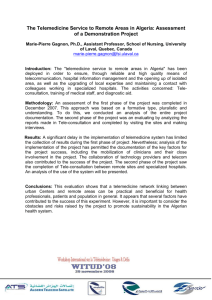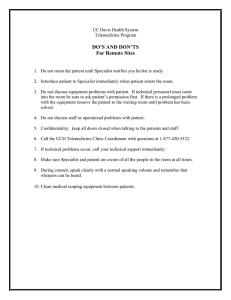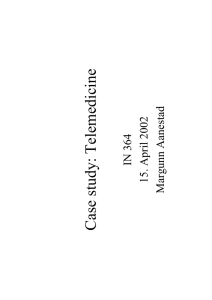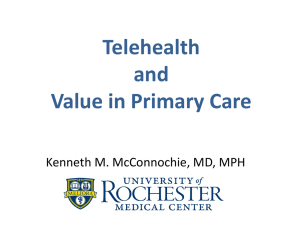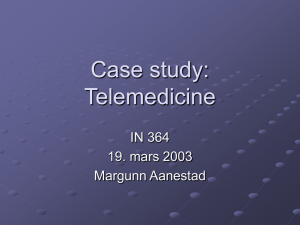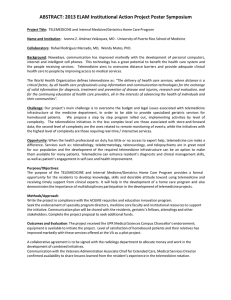Federal Court Enjoins Texas Medical Board from
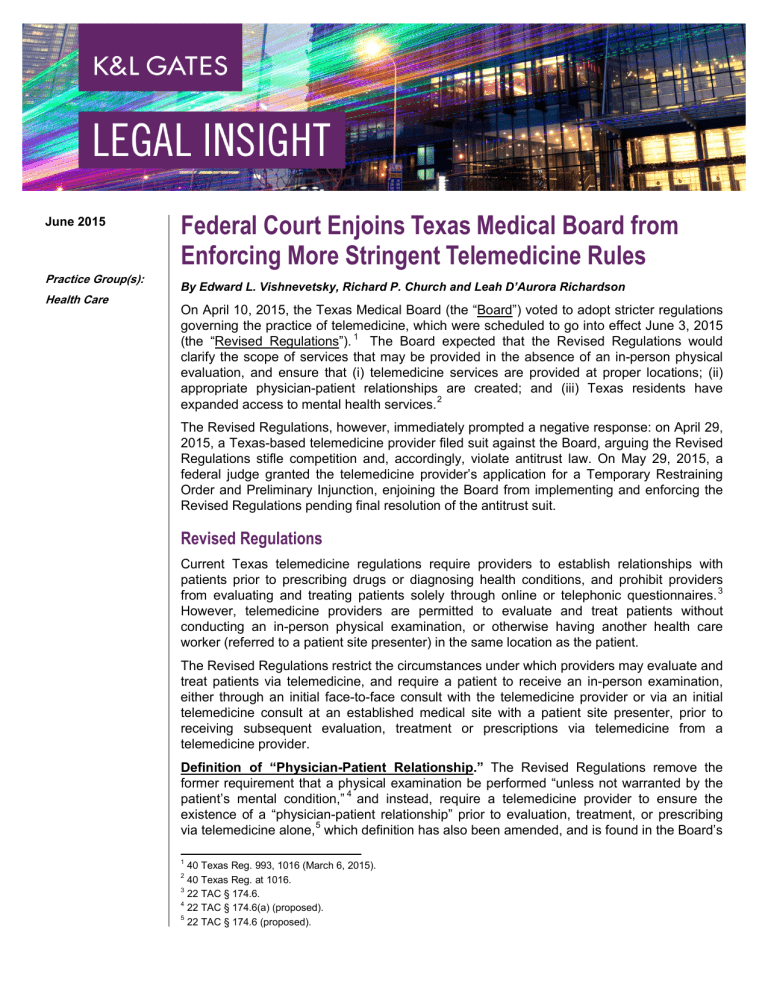
June 2015
Practice Group(s):
Health Care
Federal Court Enjoins Texas Medical Board from
Enforcing More Stringent Telemedicine Rules
By Edward L. Vishnevetsky, Richard P. Church and Leah D’Aurora Richardson
On April 10, 2015, the Texas Medical Board (the “Board”) voted to adopt stricter regulations governing the practice of telemedicine, which were scheduled to go into effect June 3, 2015
(the “Revised Regulations”).
The Board expected that the Revised Regulations would clarify the scope of services that may be provided in the absence of an in-person physical evaluation, and ensure that (i) telemedicine services are provided at proper locations; (ii) appropriate physician-patient relationships are created; and (iii) Texas residents have expanded access to mental health services.
The Revised Regulations, however, immediately prompted a negative response: on April 29,
2015, a Texas-based telemedicine provider filed suit against the Board, arguing the Revised
Regulations stifle competition and, accordingly, violate antitrust law. On May 29, 2015, a federal judge granted the telemedicine provider’s application for a Temporary Restraining
Order and Preliminary Injunction, enjoining the Board from implementing and enforcing the
Revised Regulations pending final resolution of the antitrust suit.
Revised Regulations
Current Texas telemedicine regulations require providers to establish relationships with patients prior to prescribing drugs or diagnosing health conditions, and prohibit providers from evaluating and treating patients solely through online or telephonic questionnaires.
However, telemedicine providers are permitted to evaluate and treat patients without conducting an in-person physical examination, or otherwise having another health care worker (referred to a patient site presenter) in the same location as the patient.
The Revised Regulations restrict the circumstances under which providers may evaluate and treat patients via telemedicine, and require a patient to receive an in-person examination, either through an initial face-to-face consult with the telemedicine provider or via an initial telemedicine consult at an established medical site with a patient site presenter, prior to receiving subsequent evaluation, treatment or prescriptions via telemedicine from a telemedicine provider.
Definition of “Physician-Patient Relationship.” The Revised Regulations remove the former requirement that a physical examination be performed “unless not warranted by the patient’s mental condition,”
and instead, require a telemedicine provider to ensure the existence of a “physician-patient relationship” prior to evaluation, treatment, or prescribing via telemedicine alone,
which definition has also been amended, and is found in the Board’s
1
40 Texas Reg. 993, 1016 (March 6, 2015).
2
40 Texas Reg. at 1016.
3
22 TAC § 174.6.
4
22 TAC § 174.6(a) (proposed).
5
22 TAC § 174.6 (proposed).
Federal Court Enjoins Texas Medical Board from Enforcing More Stringent
Telemedicine Rules disciplinary guidelines concerning prescriptions of certain drugs.
The current regulation requires a provider to use “acceptable medical practices such as patient history, mental status examination, physical examination and appropriate diagnostic laboratory testing” prior to issuing a prescription to a patient.
However, the Board has now amended this regulation to require a physician, at a minimum, to:
•
Establish a patient’s identity.
•
Establish a diagnosis through acceptable medical practices, including documenting and performing a patient history, mental status examination, an in-person physical examination, and appropriate diagnostic and laboratory testing.
•
Discuss the diagnosis, the evidence supporting the diagnosis, and risks and benefits of treatment options with the patient.
•
Ensure the availability of appropriate follow-up care for the patient.
The in-person physical examination requirement can be satisfied by either an “in-person evaluation” or a “face-to-face visit.” An “in-person evaluation” is defined as an evaluation performed by a provider who is in the same location as the patient. Similarly, a “face-to-face visit” is defined as an evaluation performed on a patient where, again, the provider and patient are in the same location or where the patient is at an “established medical site,” which is a location in which a patient site presenter is present with the patient and medical technology sufficient to allow an adequate and appropriate physical evaluation are both present.
A “patient site presenter” is an individual licensed or certified to perform health care or certain mental health services who is at a location with a patient, and to whom a telemedicine provider may delegate tasks, such as performing a physical examination.
Once a physician-patient is established, the provider may then treat the patient via telemedicine in the future.
Definition of “Established Medical Site.” An “established medical site” is defined as a location “where there is a patient site presenter and sufficient technology and medical equipment to allow for an adequate physical evaluation, as appropriate for the patient's presenting complaint.”
Current Texas regulations distinguish telemedicine services provided to a patient located at “an established medical site” and those provided to a patient not at an “established medical site.” Under the current rule, a provider is permitted to establish, diagnose, and treat a patient located in an established medical site via telemedicine,
and the Board’s current informal guidance states that it does not limit the type of care that a patient may receive at an established medical site.
Under the current rule, if a patient is not at an established medical site, the patient must have had at least one in person treatment visit with the physician via in person examination or telemedicine at an
6
22 TAC § 190.8(1)(L) (proposed).
7
22 TAC § 190.8(1)(L) (emphasis added).
8
22 TAC § 190.8(1)(L) (proposed) (emphasis added).
9
22 TAC § 174.2(2).
10
22 TAC § 174.2(7).
11
22 TAC § 174.2(2) (proposed).
12
22 TAC § 174.6.
13
Texas Medical Board, Telemedicine FAQs, http://www.tmb.state.tx.us/faq.
2
Federal Court Enjoins Texas Medical Board from Enforcing More Stringent
Telemedicine Rules established medical site (including patient site presenter)prior to evaluation and treatment via telemedicine, either with the telemedicine provider or a referring physician.
The Board has now revised the definition of “established medical site” to clarify that a telemedicine provider must establish a “defined physician-patient relationship,” which requires an in-person examination by the telemedicine provider, either via direct face-to-face consult with the telemedicine provider or via telemedicine at an established medical site with a patient site presenter, prior to prescribing prescription drugs, as discussed above.
Notwithstanding that general rule, the revised definition would allow telemedicine services to be provided in the absence of an in-person physical examination at certain mental health centers, where a patient is a resident, and a patient’s home, if the services are limited to mental health services.
Definition of “Standard of Care.” The revised definition of “standard of care” clarifies that telemedicine services are held to the same standard of care as traditional clinical services.
Mental Health Services via Telemedicine.
The Revised Regulations permit a patient’s residence, including a group or institutional home, to be considered an established medical site for mental health services. The Revised Regulations further clarify that a patient site presenter is not required to be present for telemedicine encounters at an established medical site if the services are related to mental health, except in cases of “behavioral emergencies.”
Definition of “Group or Institutional Setting.” Under the Revised Regulations, “Group or
Institutional Setting” is defined as the location where mental health services may be provided under the telemedicine rules.
A “Group or Institutional Setting” includes residential treatment facilities, halfway houses, jails, nursing homes, and other healthcare facilities.
Antitrust Complaint and Preliminary Injunction
On April 29, 2015, Dallas-based Teladoc, Inc. (“Teladoc”), the largest US telemedicine provider, filed an antitrust lawsuit in U.S. District Court for the Western District of Texas (the
“District Court”) against the Board to block the new requirement in the Revised Regulations that an in-person physical examination, either by the telemedicine provider or a patient site presenter, be conducted prior to providing diagnosis, treatment, and prescription via telemedicine.
Noting that 12 of the 14 Board members who approved the Revised
Regulations are practicing physicians, the Complaint alleges that the new requirement restricts competition and that Teladoc will suffer irreparable harm should the new requirement be implemented.
14
22 TAC § 174.7.
15
22 TAC § 174.2(2) (proposed).
16
22 TAC § 174.6(d)(2)(C) (proposed).
17
22 TAC § 174.6(c) (proposed). A “behavioral emergency” is defined in 25 TAC § 415.253 as “a situation involving an individual who is behaving in a violent or self-destructive manner and in which preventive, de-escalative, or verbal techniques have been determined to be ineffective and it is immediately necessary to restrain or seclude the individual to prevent: (A) imminent probable death or substantial bodily harm to the individual because the individual is attempting to commit suicide or inflict serious bodily harm; or (B) imminent physical harm to others because of acts the individual commits.”
18
22 TAC § 174.2(11) (proposed).
19
Complaint at 3–4, Teladoc, Inc. v. Tx. Med. Bd., No. 1:15-cv-343 (W.D. Tx. April 29, 2015).
20
Id . at 9–12.
3
Federal Court Enjoins Texas Medical Board from Enforcing More Stringent
Telemedicine Rules
Teladoc’s lawsuit comes on the heels of the Supreme Court’s recent decision in favor of the
Federal Trade Commission (“FTC”), which alleged that the North Carolina Dental Board— comprised almost entirely of practicing dentists (aka “market participants”)—violated federal antitrust laws and illegally restricted competition by excluding non-dentists from performing teeth-whitening procedures.
The Court concluded that state licensing boards composed of market participants do not enjoy automatic immunity from antitrust laws.
On May 29, 2015, the District Court issued an Order granting Teladoc’s Application for a
Temporary Retraining Order and Preliminary Injunction.
Interestingly, the Board declined to assert any state immunity defenses in response to Teladoc’s Application, and instead, maintained that Teladoc could not demonstrate the required anti-competitive effect under the
Sherman Antitrust Act.
The District Court disagreed, concluding that Teladoc is likely to succeed in showing that the Revised Regulations—specifically, the new requirement in the disciplinary guidelines that a telemedicine provider establish a “defined physician-patient relationship” prior to evaluation, treatment, or prescribing—illegally limits competition by requiring a physical examination by either a face-to-face visit or in-person evaluation, before physicians are allowed to prescribing medication to patients.
Implications
Consistent with other states, the Board has affirmed that the standard of care should apply equally to clinical medical services and telemedicine services. Further, the Board’s expansion of the availability of mental health services (where physical examination is atypical, even in face-to-face encounters) through telemedicine is clearly a step forward for mental health providers in Texas.
However, as many states look to expand the availability of telemedicine services and allow physicians to rely on their own professional judgment as to whether treatment of a patient is appropriate through telemedicine, Texas has moved in the opposite direction by requiring an in-person examination to initiate a physician-patient relationship in all cases that do not involve mental health services. Most notably, the Revised Regulations now appear to preclude the one-off consultations for minor health issues that many people have come to associate with telemedicine.
While many healthcare providers may view these amendments as strengthening the standard of care for medical practice in Texas, telemedicine providers and employers, who view telemedicine as a more cost-effective way to provide healthcare, have already expressed frustration over the Board’s position. Many have expressed that explicit removal of a telemedicine provider’s discretion as to whether a physical examination should be performed prior to providing such evaluation and treatment now holds telemedicine providers to a higher standard than providers in traditional clinical settings, and therefore, is overly rigid.
21
N.C. Bd. of Dental Examiners v. Fed. Trade Cmm’n, 574 U.S. __ (Feb. 25, 2015) (slip op.).
22
Order, Teladoc, Inc. v. Tx. Med. Bd., No. 1:15-cv-343 RP (W.D. Tx. May 29, 2015).
23
Id.
at 5–6.
24
Id.
at 20.
25
See, e.g., Letter from Am. Telemedicine Assoc. to Tx. Med. Bd. (Apr. 8, 2015).
4
Federal Court Enjoins Texas Medical Board from Enforcing More Stringent
Telemedicine Rules
Authors:
Edward L. Vishnevetsky
Edward.v@klgates.com
+1.214.939.5525
Richard P. Church richard.church@klgates.com
+1.919.466.1187
Leah D’Aurora Richardson leah.richardson@klgates.com
+1.919.466.1126
Anchorage Austin Beijing Berlin Boston Brisbane Brussels Charleston Charlotte Chicago Dallas Doha Dubai Fort Worth Frankfurt
Harrisburg Hong Kong Houston London Los Angeles Melbourne Miami Milan Moscow Newark New York Orange County Palo Alto Paris
Perth Pittsburgh Portland Raleigh Research Triangle Park San Francisco São Paulo Seattle Seoul Shanghai Singapore Spokane
Sydney Taipei Tokyo Warsaw Washington, D.C. Wilmington
K&L Gates comprises more than 2,000 lawyers globally who practice in fully integrated offices located on five continents. The firm represents leading multinational corporations, growth and middle-market companies, capital markets participants and entrepreneurs in every major industry group as well as public sector entities, educational institutions, philanthropic organizations and individuals. For more information about K&L Gates or its locations, practices and registrations, visit www.klgates.com
.
This publication is for informational purposes and does not contain or convey legal advice. The information herein should not be used or relied upon in regard to any particular facts or circumstances without first consulting a lawyer.
© 2015 K&L Gates LLP. All Rights Reserved.
5
